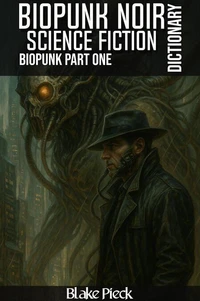The Environmental Biopunk Dictionary is a curated lexicon of a future where life and landscape are reshaped by biotechnology, often with unintended, irreversible consequences. It captures the terminology of worlds where gene-edited ecosystems, synthetic organisms, and corporate-driven climate engineering collide with the raw forces of nature. Every entry delves into the science, ethics, and survival language of a subgenre where biology is weaponized against the planet and, sometimes, in its defense.
Inside, you'll find the technical jargon of environmental bioengineering, the street talk of eco-resistance movements, and the coded language of black-market ecological tinkers. From engineered superflora to self-replicating bioweapons disguised as conservation projects, each definition reveals how environmental manipulation can both save and doom entire worlds. For authors, worldbuilders, and fans, this dictionary serves as both a creative resource and a cautionary archive, charting the words that define a future where nature is no longer a force to be preserved, but a system to be rewritten.
Environmental Biopunk - A branch of biopunk that focuses on the intersection of biotechnology and environmental issues. In these settings, environmental collapse, such as climate change or resource depletion, drives the development of new biotechnologies to sustain life. The manipulation of plants, animals, and microorganisms for ecological restoration, or the creation of synthetic ecosystems, often plays a role in narratives exploring how humanity tries to adapt or control nature to survive.
The Environmental Biopunk Dictionary is a curated lexicon of a future where life and landscape are reshaped by biotechnology, often with unintended, irreversible consequences. It captures the terminology of worlds where gene-edited ecosystems, synthetic organisms, and corporate-driven climate engineering collide with the raw forces of nature. Every entry delves into the science, ethics, and survival language of a subgenre where biology is weaponized against the planet and, sometimes, in its defense.
Inside, you'll find the technical jargon of environmental bioengineering, the street talk of eco-resistance movements, and the coded language of black-market ecological tinkers. From engineered superflora to self-replicating bioweapons disguised as conservation projects, each definition reveals how environmental manipulation can both save and doom entire worlds. For authors, worldbuilders, and fans, this dictionary serves as both a creative resource and a cautionary archive, charting the words that define a future where nature is no longer a force to be preserved, but a system to be rewritten.
Environmental Biopunk - A branch of biopunk that focuses on the intersection of biotechnology and environmental issues. In these settings, environmental collapse, such as climate change or resource depletion, drives the development of new biotechnologies to sustain life. The manipulation of plants, animals, and microorganisms for ecological restoration, or the creation of synthetic ecosystems, often plays a role in narratives exploring how humanity tries to adapt or control nature to survive.

 , qui est-ce ?
, qui est-ce ?